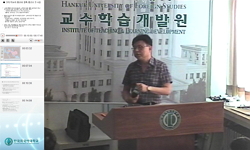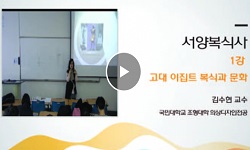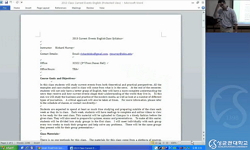This paper examines the internalization of colonialism and image aesthetics in Korean movies under late Japanese imperialism, and discusses colonialism as its central topic. The existing discourses on Angel without Home and Volunteer have shown limits...
http://chineseinput.net/에서 pinyin(병음)방식으로 중국어를 변환할 수 있습니다.
변환된 중국어를 복사하여 사용하시면 됩니다.
- 中文 을 입력하시려면 zhongwen을 입력하시고 space를누르시면됩니다.
- 北京 을 입력하시려면 beijing을 입력하시고 space를 누르시면 됩니다.

일제말기 한국 영화에 나타난 혼종성: <집 없는 천사>와 <지원병>을 중심으로 = The Emergence of Hybridity in Korean Movies under Late Japanese Imperialism: Angle without Home and Volunteer
한글로보기https://www.riss.kr/link?id=A104152171
-
저자
장수경 (고려대학교)
- 발행기관
- 학술지명
- 권호사항
-
발행연도
2008
-
작성언어
Korean
-
주제어
hybridity ; colonialism ; Naeseonilche ; imperialism ideology ; militarism ; orphan consciousness ; desire for modern city ; 혼종성 ; 식민담론 ; 내선일체 ; 제국주의 ; 군국주의 ; 근대 도시에 대한 욕망 ; 고아의식 ; hybridity ; colonialism ; Naeseonilche ; imperialism ideology ; militarism ; orphan consciousness ; desire for modern city
-
등재정보
KCI등재
-
자료형태
학술저널
-
수록면
409-429(21쪽)
-
KCI 피인용횟수
4
- 제공처
-
0
상세조회 -
0
다운로드
부가정보
다국어 초록 (Multilingual Abstract)
The first part of the paper places the re-discovery of Korean movies and the discussion of colonialism at its analytic center. The second part analyzes the dualism of colony and Naeseonilche(Joseon and Japan are one body) on the basis of orphan consciousness and the aspect of Naeseonilche appearing in Angel without Home. In the analytic process, I find the diverging point of logical rupture and hybridity in the movie from director Choi In Kyu’s inner disruption. The third part deals with the desire for modern city and militarism in Volunteer. I also focus on the distortion of Park Young Hee, the original author and An Seok Young, the director from the desire for modern city, and proceeding to militarism. In addition, I show how they revealed the ideology of imperialism and how the rupture appears in the movie. The fourth part analyzes the hybridity emerging from the collision of colony and imperialism in both works. In particular, I find that the hybridity of languages in the movies was closely related to the nation.
Through the above research, I find that the two movies reflects the reality of a colony, and restores the nation by showing the hybridity through its collision against imperialism.
This paper examines the internalization of colonialism and image aesthetics in Korean movies under late Japanese imperialism, and discusses colonialism as its central topic. The existing discourses on Angel without Home and Volunteer have shown limits by focusing only on nationalism and realism. On the contrary, this paper changes the direction from the dichotomy of the two works to the way the colonized confront imperialism in the movies and represent their desire.
The first part of the paper places the re-discovery of Korean movies and the discussion of colonialism at its analytic center. The second part analyzes the dualism of colony and Naeseonilche(Joseon and Japan are one body) on the basis of orphan consciousness and the aspect of Naeseonilche appearing in Angel without Home. In the analytic process, I find the diverging point of logical rupture and hybridity in the movie from director Choi In Kyu’s inner disruption. The third part deals with the desire for modern city and militarism in Volunteer. I also focus on the distortion of Park Young Hee, the original author and An Seok Young, the director from the desire for modern city, and proceeding to militarism. In addition, I show how they revealed the ideology of imperialism and how the rupture appears in the movie. The fourth part analyzes the hybridity emerging from the collision of colony and imperialism in both works. In particular, I find that the hybridity of languages in the movies was closely related to the nation.
Through the above research, I find that the two movies reflects the reality of a colony, and restores the nation by showing the hybridity through its collision against imperialism.
다국어 초록 (Multilingual Abstract)
The first part of the paper places the re-discovery of Korean movies and the discussion of colonialism at its analytic center. The second part analyzes the dualism of colony and Naeseonilche(Joseon and Japan are one body) on the basis of orphan consciousness and the aspect of Naeseonilche appearing in Angel without Home. In the analytic process, I find the diverging point of logical rupture and hybridity in the movie from director Choi In Kyu’s inner disruption. The third part deals with the desire for modern city and militarism in Volunteer. I also focus on the distortion of Park Young Hee, the original author and An Seok Young, the director from the desire for modern city, and proceeding to militarism. In addition, I show how they revealed the ideology of imperialism and how the rupture appears in the movie. The fourth part analyzes the hybridity emerging from the collision of colony and imperialism in both works. In particular, I find that the hybridity of languages in the movies was closely related to the nation.
Through the above research, I find that the two movies reflects the reality of a colony, and restores the nation by showing the hybridity through its collision against imperialism.
This paper examines the internalization of colonialism and image aesthetics in Korean movies under late Japanese imperialism, and discusses colonialism as its central topic. The existing discourses on Angel without Home and Volunteer have shown limits...
This paper examines the internalization of colonialism and image aesthetics in Korean movies under late Japanese imperialism, and discusses colonialism as its central topic. The existing discourses on Angel without Home and Volunteer have shown limits by focusing only on nationalism and realism. On the contrary, this paper changes the direction from the dichotomy of the two works to the way the colonized confront imperialism in the movies and represent their desire.
The first part of the paper places the re-discovery of Korean movies and the discussion of colonialism at its analytic center. The second part analyzes the dualism of colony and Naeseonilche(Joseon and Japan are one body) on the basis of orphan consciousness and the aspect of Naeseonilche appearing in Angel without Home. In the analytic process, I find the diverging point of logical rupture and hybridity in the movie from director Choi In Kyu’s inner disruption. The third part deals with the desire for modern city and militarism in Volunteer. I also focus on the distortion of Park Young Hee, the original author and An Seok Young, the director from the desire for modern city, and proceeding to militarism. In addition, I show how they revealed the ideology of imperialism and how the rupture appears in the movie. The fourth part analyzes the hybridity emerging from the collision of colony and imperialism in both works. In particular, I find that the hybridity of languages in the movies was closely related to the nation.
Through the above research, I find that the two movies reflects the reality of a colony, and restores the nation by showing the hybridity through its collision against imperialism.
참고문헌 (Reference)
1 김재용, "협력과 저항" 소명 2004
2 고미숙, "한국의 근대성 그 기원을 찾아서" 책세상 2001
3 이영일, "한국영화전사" 도서출판 소도 2004
4 이효인, "한국영화 역사강의1" 이론과 실천 1992
5 김려실, "투사하는 제국 투영하는 식민지" 삼인 2006
6 고부응, "탈식민주의:이론과 쟁점" 문학과지성 2003
7 "최인규 연출. <집 없는 천사>. 고려영화주식회사. 1941. .한국영상자료원, 2006"
8 박영희, "초창기의 문단측면사(4)" 60 :
9 박영희, "창작과 비평의 교류"
10 임화, "조선영화론" 춘추 1941
1 김재용, "협력과 저항" 소명 2004
2 고미숙, "한국의 근대성 그 기원을 찾아서" 책세상 2001
3 이영일, "한국영화전사" 도서출판 소도 2004
4 이효인, "한국영화 역사강의1" 이론과 실천 1992
5 김려실, "투사하는 제국 투영하는 식민지" 삼인 2006
6 고부응, "탈식민주의:이론과 쟁점" 문학과지성 2003
7 "최인규 연출. <집 없는 천사>. 고려영화주식회사. 1941. .한국영상자료원, 2006"
8 박영희, "초창기의 문단측면사(4)" 60 :
9 박영희, "창작과 비평의 교류"
10 임화, "조선영화론" 춘추 1941
11 임화, "조선영화론" 춘추 1941
12 이화진, "조선영화-소리의 도입에서 친일 영화까지" 책세상 2005
13 최유리, "일제말기 식민지 지배정책 연구" 국학자료원 1997
14 "안석영 연출. <지원병>. 동화영화 제작소. 1941. 한국영상자료원. 2006"
15 신명직, "안석영 만문만화 연구" 17 (17): 7-67, 2001
16 박영희, "신시대의 문학과 이념"
17 김희윤, "식민시기 조선영화와 관객담론 구성에 관한 연구" 한국예술종합학교 영상원 2007
18 김화, "새로 쓴 한국영화 전사" 다인미디어 2003
19 이순진, "발굴된 과거" 한국영상자료원 2006
20 노상래, "박영희 연구" 25 (25): 357-395, 1994
21 엔더슨,베네딕트, "민족주의 기원과 전파" 나남 1991
22 백철, "문학자서전" 박영사 1976
23 윤대석, "근대문학연구" 태학사 2003
24 이상갑, "‘전향’과 ‘친일’의 한 좌표―박영희론" 현대문학이론학회 21 (21): 223-243, 2004
동일학술지(권/호) 다른 논문
-
'일상'의 미학적 실천과 사유의 궤적: 김영하, 홍상수의 작품을 중심으로
- 문학과영상학회
- 이평전
- 2008
- KCI등재
-
제삼세게 영화의 정체성과 가능성: 프레드릭 제임슨의 "민족적 알레고리" 개념의 재고
- 문학과영상학회
- 남수영
- 2008
- KCI등재
-
제임스 본드 프랜차이즈의 새로은 시작: <카지노로얄>의 변식과 정형의 반복
- 문학과영상학회
- 심경석
- 2008
- KCI등재
-
한국 사극영화 장르 관습의 형성에 관한 일고찰: '신필름'의 <연산군>의 연작을 중심으로
- 문학과영상학회
- 박유희
- 2008
- KCI등재
분석정보
인용정보 인용지수 설명보기
학술지 이력
| 연월일 | 이력구분 | 이력상세 | 등재구분 |
|---|---|---|---|
| 2026 | 평가예정 | 재인증평가 신청대상 (재인증) | |
| 2020-01-01 | 평가 | 등재학술지 유지 (재인증) |  |
| 2019-08-06 | 학회명변경 | 영문명 : Korean Association Of Literature And Film -> The Korean Association Of Literature and Film |  |
| 2017-01-01 | 평가 | 등재학술지 유지 (계속평가) |  |
| 2013-01-01 | 평가 | 등재학술지 유지 (등재유지) |  |
| 2010-01-01 | 평가 | 등재학술지 유지 (등재유지) |  |
| 2008-01-01 | 평가 | 등재학술지 유지 (등재유지) |  |
| 2005-01-01 | 평가 | 등재학술지 선정 (등재후보2차) |  |
| 2004-01-01 | 평가 | 등재후보 1차 PASS (등재후보1차) |  |
| 2003-01-01 | 평가 | 등재후보학술지 선정 (신규평가) |  |
학술지 인용정보
| 기준연도 | WOS-KCI 통합IF(2년) | KCIF(2년) | KCIF(3년) |
|---|---|---|---|
| 2016 | 0.17 | 0.17 | 0.2 |
| KCIF(4년) | KCIF(5년) | 중심성지수(3년) | 즉시성지수 |
| 0.23 | 0.26 | 0.491 | 0.04 |




 ScienceON
ScienceON KISS
KISS





